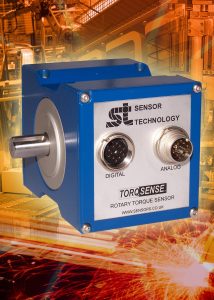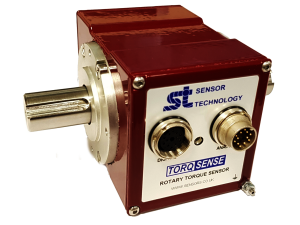Specialist industrial motor manufacturer Solutions Engineering in Stoke on Trent is able to test the performance of its motors, having built a test station to its own specification based around a piezo electric torque transducer.
It manufactures a range of bespoke slip ring motors for driving equipment such as vibrators and pumps, currently in sizes 4kW to 55kW but with plans for larger units in the future.
 “Our motors are very robust and are often returned to us after 20 or 30 years arduous service for re-engineering,” says MD David Wood. “Because most of our motors are one-offs we couldn’t find an off-the-shelf test rig that met our wide ranging needs so we set about building our own. The mechanical side of the design had to allow for a considerable variation in motor sizes but by using a TorqSense transducer we were able to keep the electrical engineering commendably simple.”
“Our motors are very robust and are often returned to us after 20 or 30 years arduous service for re-engineering,” says MD David Wood. “Because most of our motors are one-offs we couldn’t find an off-the-shelf test rig that met our wide ranging needs so we set about building our own. The mechanical side of the design had to allow for a considerable variation in motor sizes but by using a TorqSense transducer we were able to keep the electrical engineering commendably simple.”
The test load is created using an eddy current brake, which was made by replacing the armature of a DC motor with a solid block, with a large integral cooling fan for thermal management during heavy duty testing. In fact there are two brakes, large and small, which can be easily interchanged to match the motor being tested.
“During tests we vary the load by injecting a field into the brake using a variable output DC drive,” says Wood.
The brake aligns with the TorqSense, which is mounted on two fixed pedestal bearings, and is connected to its output shaft. The test motor is mounted on a variable height bed and connected via a cardan shaft to the input shaft of the transducer.
TorqSense monitors the torque in a rotating shaft without actually contacting it, thus doing away with slip rings and other delicate components. Instead it uses a radio frequency transmission head to monitor ‘surface affect waves’ which are created by all rotating bodies.
Output signals from TorqSense are fed into a PC for analysis: Solutions Engineering chose – as do most users – to use TorqView2, a dedicated software programme which generates a real time visual instrumentation display as well logging the data for later analysis.
TorqView2 was introduced by TorqSense’s manufacturer, Sensor Technology Ltd, to make the technology as user friendly as possible. It provides fully configurable and scalable graphics modules, so that the information can be presented in a number of different formats including as discrete digital readouts, as analogue dials, as bar graphs, etc. User configurable inputs, such as 4-20mA signals from accelerometers allow complete customisation of TorqView2 for every application.
Data such as peak values, time-sequenced and time-stamped values, etc, can also be collected and stored in text files or spreadsheets and exported to other programmes for subsequent analysis. Text comments can be incorporated into the data, either using an auto-trigger function or discretely as the user requires.
“TorqSense transducers are the easiest and most reliable way I have found to collect real-time performance data from machine drive shafts,” says Wood. “TorqView2’s user friendliness continues this ideal of simplicity. All our engineers and technicians use the test rig with a fluency that is only possible because of the simplicity inherent in every aspect of its design.”





